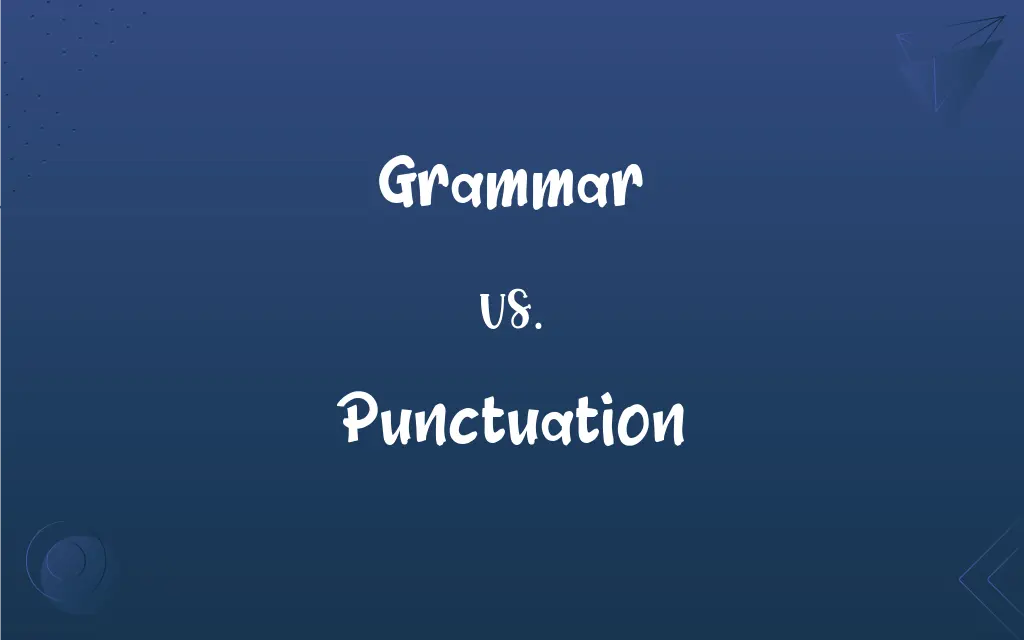Grammar vs. Punctuation: What's the Difference?
Edited by Aimie Carlson || By Janet White || Updated on November 6, 2023
Grammar is the structural foundation of our ability to express ourselves in writing, while punctuation contributes to the rhythm, voice, and clarity of that expression.

Key Differences
Grammar is the set of structural rules governing the composition of clauses, phrases, and words in any given language. Punctuation, on the other hand, consists of symbols that help writers clarify how their words should be read.
Grammar is intrinsic to language; it's the system that allows for communication and understanding between individuals. Punctuation provides the pauses, stops, and emphasis that mimic the rises and falls of speech within the written word.
Grammar rules can dictate verb tense, subject-verb agreement, and the proper use of pronouns, among other things. Punctuation marks, such as commas and periods, guide the reader through sentences, signaling pauses and stops.
Grammar is essential for clarity, precision, and to prevent misunderstanding. Punctuation ensures that the rhythm and flow of language are maintained, providing necessary visual cues to the reader.
Grammar errors can significantly alter the meaning of a sentence or make it unintelligible. Incorrect punctuation can lead to confusion, misinterpretation, or loss of the intended emphasis or pause.
ADVERTISEMENT
Comparison Chart
Purpose
Rules for structuring language
Symbols to clarify reading
Function
Dictates sentence structure
Indicates pauses, stops, emphasis
Errors
Can cause misunderstanding
Can lead to misinterpretation
Complexity
Involves tense, agreement, pronouns
Involves specific marks
Communication
Essential for clear expression
Mimics speech patterns in writing
ADVERTISEMENT
Grammar and Punctuation Definitions
Grammar
The whole system and structure of a language.
Proper grammar ensures clarity in communication.
Punctuation
The use of spacing, conventional signs, and certain typographical devices.
Incorrect punctuation can change the meaning of a sentence.
Grammar
A particular analysis of the system and structure of language.
The study of English grammar can be quite complex.
Punctuation
The act of punctuating, or adding punctuation marks to, written material.
Her punctuation of the manuscript was meticulous.
Grammar
The basic elements of the arts, sciences, and technical knowledge.
He learned the grammar of music at a young age.
Punctuation
The marks, such as period, comma, and parentheses, used in writing.
Punctuation helps clarify the meaning of text.
Grammar
A book on grammar.
The teacher asked students to buy a grammar for class.
Punctuation
The practice, action, or system of inserting points or other small marks into texts.
Good punctuation is key to clear writing.
Grammar
The study of how words and their component parts combine to form sentences.
Punctuation
The style or art of punctuating or pointing a writing or text.
His use of punctuation made the text difficult to read.
Grammar
The study of structural relationships in language or in a language, sometimes including pronunciation, meaning, and linguistic history.
Punctuation
The use of standard marks and signs in writing and printing to separate words into sentences, clauses, and phrases in order to clarify meaning.
Grammar
The system of inflections, syntax, and word formation of a language.
Punctuation
The marks so used.
Grammar
The system of rules implicit in a language, viewed as a mechanism for generating all sentences possible in that language.
Punctuation
The act or an instance of punctuating.
Grammar
A normative or prescriptive set of rules setting forth the current standard of usage for pedagogical or reference purposes.
Punctuation
A set of symbols and marks which are used to clarify meaning in text by separating strings of words into clauses, phrases and sentences; examples include commas, hyphens, and stops (periods).
Different languages have different rules for punctuation.
Grammar
Writing or speech judged with regard to such a set of rules.
Punctuation
An act of punctuating.
Grammar
A book containing the morphologic, syntactic, and semantic rules for a specific language.
Punctuation
The act or art of punctuating or pointing a writing or discourse; the art or mode of dividing literary composition into sentences, and members of a sentence, by means of points, so as to elucidate the author's meaning.
Grammar
The basic principles of an area of knowledge
The grammar of music.
Punctuation
Something that makes repeated and regular interruptions or divisions
Grammar
A book dealing with such principles.
Punctuation
The marks used to clarify meaning by indicating separation of words into sentences and clauses and phrases
Grammar
A system of rules and principles for speaking and writing a language.
Punctuation
The use of certain marks to clarify meaning of written material by grouping words grammatically into sentences and clauses and phrases
Grammar
The study of the internal structure of words (morphology) and the use of words in the construction of phrases and sentences (syntax).
Grammar
A book describing the rules of grammar of a language.
Grammar
(computing theory) A formal system specifying the syntax of a language.
Grammar
Actual or presumed prescriptive notions about the correct use of a language.
Grammar
(computing theory) A formal system defining a formal language
Grammar
The basic rules or principles of a field of knowledge or a particular skill.
Grammar
A book describing these rules or principles; a textbook.
A grammar of geography
Grammar
(UK) A grammar school.
Grammar
To discourse according to the rules of grammar; to use grammar.
Grammar
The science which treats of the principles of language; the study of forms of speech, and their relations to one another; the art concerned with the right use and application of the rules of a language, in speaking or writing.
Grammar
The art of speaking or writing with correctness or according to established usage; speech considered with regard to the rules of a grammar.
The original bad grammar and bad spelling.
Grammar
A treatise on the principles of language; a book containing the principles and rules for correctness in speaking or writing.
Grammar
Treatise on the elements or principles of any science; as, a grammar of geography.
When any town shall increase to the number of a hundredfamilies or householders, they shall set up a grammar school, the master thereof being able to instruct youth so far as they may be fitted for the University.
Grammar
To discourse according to the rules of grammar; to use grammar.
Grammar
Studies of the formation of basic linguistic units
Grammar
The fundamental principles of an art or science.
She has mastered the grammar of filmmaking.
FAQs
Can punctuation change the meaning of a sentence?
Yes, punctuation can significantly alter a sentence's interpretation.
Can I end a sentence with a preposition in proper grammar?
While traditionally frowned upon, it's now accepted in modern English usage.
Why is grammar important?
Grammar is crucial for effective communication and avoiding misunderstandings.
How does grammar differ from syntax?
Grammar is the broader set of rules for language, while syntax refers specifically to sentence structure.
Are grammar rules the same in all English-speaking countries?
No, there are variations in grammar rules between British, American, and other English dialects.
Is grammar innate or learned?
Grammar is learned, though the capacity for language is innate.
What is the Oxford comma?
It's the comma used after the penultimate item in a list of three or more items, before 'and' or 'or.'
When should I use quotation marks?
Quotation marks are used for direct speech, quotations, and to highlight special terms.
What does a hyphen do?
It joins words or parts of words together.
Do all languages have grammar?
Yes, all languages have an underlying structure or grammar.
What is the purpose of a comma?
To indicate a pause between parts of a sentence.
What is the purpose of a semicolon?
Semicolons separate items in a list or link closely related clauses.
What is descriptive grammar?
It describes language as it's actually used, not how it should be used.
Can poor grammar affect my job prospects?
Yes, poor grammar might create a negative impression with potential employers.
What is the function of a colon?
To introduce a list, quotation, or explanation.
How often do grammar rules change?
Grammar rules evolve slowly over time based on usage.
Why is the exclamation point used?
To indicate strong emotion or emphasis.
What is a dangling modifier in grammar?
A word or phrase that modifies a word not clearly stated in the sentence.
What does an ellipsis represent?
An omission of words or a pause in speech.
Are double negatives acceptable?
In standard English, double negatives are typically considered incorrect.
About Author
Written by
Janet WhiteJanet White has been an esteemed writer and blogger for Difference Wiki. Holding a Master's degree in Science and Medical Journalism from the prestigious Boston University, she has consistently demonstrated her expertise and passion for her field. When she's not immersed in her work, Janet relishes her time exercising, delving into a good book, and cherishing moments with friends and family.
Edited by
Aimie CarlsonAimie Carlson, holding a master's degree in English literature, is a fervent English language enthusiast. She lends her writing talents to Difference Wiki, a prominent website that specializes in comparisons, offering readers insightful analyses that both captivate and inform.






































































